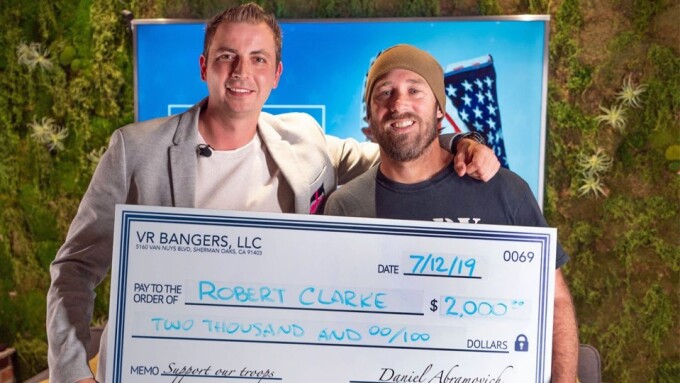LOS ANGELES — VR Bangers has uncovered a troubling double-standard in a recent update to its “Support Our Heroes” promotional campaign and outreach efforts to American veterans.
In celebration of Memorial Day earlier this year, VR Bangers sought to honor all United States military personnel, both active-duty and veterans, by offering a free two-month subscription to the site. In addition, the company pledged to donate 10 percent of its earnings, over the duration of the promo campaign, to a veteran’s support charity.
It seemed a wise move that would appeal to its audience, of which the company claims 37 percent are active or former U.S. military members.
A VR Bangers representative describes the campaign as successful, but with a disturbing result: after reaching out to 119 U.S.-based veterans support charities, only 67 responded and all of them declined the contribution because of the company’s particular business sector.
VR Bangers’ Marketing Director Igor Zhivago said he reached out to national veteran’s charities with an offer of a sizable donation and an opportunity for a joint press release to commemorate the successful completion of the campaign.
However, the charities denied the request to donate the campaign's proceeds, citing extreme caution and a reluctance to be publicly associated with the adult industry.
“We received tremendous positive praise and feedback from the online community, with a very logical [request] to witness us see it through and make good on our promises. And this is exactly what we thought we could do,” Zhivago explained. “But this is where the obstacles started to arise.”
“I personally contacted charities like the Gary Sinise Foundation, Semper Fi Fund, Special Operations Warrior Foundation, Fisher House Foundation, Freedom Service Dogs of America, Air Warrior Courage Foundation, Operation Second Chance, Hope for the Warriors and another 67 national and local charities,” Zhivago revealed, “and they all respectfully declined our charitable contribution [in order to] maintain a positive public image of the company and ensure continuous donations from [their] regular donors.’”
In response to the unwillingness of established charities to accept its donation, VR Bangers decided to give the money directly to veterans in need by publishing an address to allow them to reach out directly to the company, and also producing a candid, compelling video interview with one of them, United States Marine Corps veteran Robert Clarke.
Among the troubling details that VR Bangers learned from veterans was that charities are only required to give 11 percent of their intake to their specific cause — leaving 89 percent for administrative overhead such as advertising and salaries — a situation that can easily lead to systemic abuse, and in this case, less money actually reaching the veterans in need.
This was particularly disturbing for Zhivago, who comes from a military family.
“We can’t solve this troubling issue, but we can do something,” he said. “This is why we reached out to the veterans directly. Although we can’t help everyone, we would like to divide the proceeds from our initiative into individual donations [to] veterans who reached out to us.”
“We understand that we won’t be able to claim it as a charitable tax deduction because the money goes to individuals,” Zhivago added. “We are okay with that because we want to be sure that 100 percent, not just 11 percent, will go to those who can truly use it.”
Regardless of the policies and practices of any specific charity or corporate promotion, the bottom line is that when funds are raised for the benefit of a select group of people, the money collected on their behalf should actually reach those in need — and not be denied due to a double-standard based in bigotry and discrimination, pure greed or vague notions of “political correctness.”
For more information on VR Bangers’ outreach to veterans, click here.








